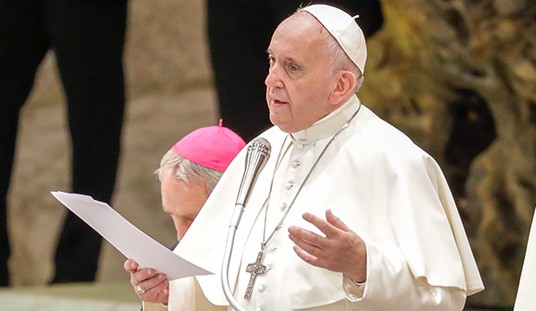God asked me for faith the size of a mustard seed. Atheism asked me for more faith than I could possibly possess.
I was watching the conversation between Bill Maher and Charlie Kirk, when the conversation turned to God, as I knew it inevitably would. Maher can't help but thumb his nose at God and anyone who truly believes in him, and Kirk is one of those people who would allow Maher to scratch that sacrilegious itch.
During the course of the conversation, Maher said he struggled to understand why someone who is so intellectual as Kirk would buy into religion at all, and Kirk did what Kirk does. He calmly explained in very easy-to-understand terms why his position was the right and logical one. In fact, Kirk hit all the notes I would have, and I can tell we're both students of C.S. Lewis on this matter.
Give it a watch. It's well worth it.
Charlie Kirk educates Bill Maher on Christianity: “There are so many fine-tuning aspects to our existence that I think defy the idea that this is all randomness and all chance.”
— RedWave Press (@RedWave_Press) April 21, 2025
Charlie Kirk: “Is there any part of the Bible that you think is true?”
Bill Maher: *Laughs*… pic.twitter.com/QPo9X9fu1v
But I always struggled with the idea that Christianity was somehow "illogical." Even on a scientific basis, it makes more sense for there to be a creator than not. Even with the miracles performed that defy all scientific explanation, Christianity makes all the sense in the world.
For one, Kirk brings up the obvious point that too much fell into place too perfectly for things not to be from a designer. I've touched on this before in a previous article, where I came to the conclusion that, yes, we're living in a kind of rules-based simulation, as many physicists will attest to. Not one designed by some machine overlord (our universe isn't so simple as that), but a loving God, which I'll repeat here:
You'll find a lot of physicists seem to believe we're living in a simulation. Physicist and cosmologist Max Tegmark has written quite a bit on the mathematical nature and precision of the universe, suggesting its structure is mathematical, much like a game program would be. Nobel laureate Eugene Wigner called this the “unreasonable effectiveness of mathematics in the natural sciences.”
Nobel Prize-winning astrophysicist George Smoot believes we live in a programmed universe, and even delivered a TED Talk titled “You Are a Simulation & Physics Can Prove It.” Physicist Martin Savage notes that anomalies found in particle physics such as limitations in high-energy cosmic rays could indicate a "resolution" to our universe not unlike pixels on a screen.
The precision of the strength of gravity or the speed of light, and the ratio of matter to antimatter is so precise that physicist Paul Davies said, “The impression of design is overwhelming.”
The Bible itself even hints at this universe being a shadow of another world, and Lewis himself even referred to our reality as a "shadowland."
(READ: Are We Living in a Simulation? Brace Yourself)
If any of these cosmological constants were off, even by a fraction, none of this would exist. Oxford Physicist Sir Roger Penrose (not a Christian) did the math and came to the conclusion that the odds for a life-sustaining universe to exist are 1 in 10¹⁰¹²³. I can't write that number out, because your browser would crash from the weight of the digital load of zeroes.
Even the odds for the formation of a singular protein are astronomical. Director of the Biologic Institute and Maxwell Professor of Molecular Biology at Biola University Douglas Axe calculated the odds that a singular protein — the building block of life — arising from non-life at 1 in 10⁷⁷, or 1 followed by 77 zeroes.
That's just for one singular protein. A living organism requires hundreds at once, and all of them working together in sync.
So we live in a constantly sustained universe that is overly hostile to life, yet it's sustaining life that would defy all odds to be alive in the first place.
Logically, it makes absolutely no sense... until you insert a designer.
The atheists will retort by leaning into things like the "anthropic principle," which is effectively "well... we just got really, really lucky, and it happened because we can observe the universe." I'm here to tell you that nothing and no one is that lucky; moreover, nothing and no one stays that lucky by chance for that long.
Let's look at this in Vegas terms.
The average rolling streak at a craps table is eight or nine times before the roller sevens out. To hit a streak of 50 is about nine in 10,000 times.
Imagine a roller coming to the table and never losing. He rolls perfectly every time, making himself and everyone at the table the biggest winners in all the universe. It would be a total logic-breaking run.
If your response to this scenario is "Well... it could happen," then congratulations, you have way more faith in blind chance than I ever had in God. That's atheism in my eyes, though. It requires an unrealistic amount of faith, despite all the talk that atheists have none.
They do, their god is just chance, not a designer, and I find that wildly illogical.
Even the core question of "How did we get something from nothing?" isn't exactly answerable by atheists, who see this massive gap in logic and respond with "I don't know," which is another way of saying "The 'how' is still unanswerable, but I still think it was all by chance."
Meanwhile, I already have a perfectly reasonable explanation.
"In the beginning, God created the heavens and the earth."















